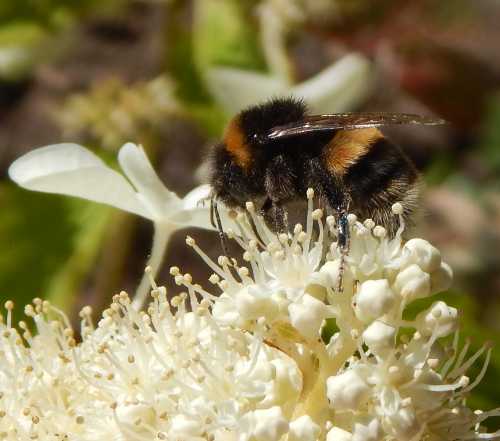Do Bees Visit Yellow Flowers?
Do bees visit yellow flowers?
My understanding is that bees like blue and purple. I can't find much information about yellow flowers. I love to see yellow in my garden.
Jane, UK.
Short answer:
Yes, bees do visit yellow flowers! There are many examples of wonderful yellow flowers for bees - including wildflowers, garden plants and flowering shrubs.
I also love yellow, and have some elegant yellow flag iris, hypericum 'hidcote', wallflowers, helianthus and bird's foot trefoil in my tiny garden. Bees love them!
Yellow Flowers And Shrubs For Bees
Bees are attracted to flowers offering a rich source of nectar and pollen, and there are plenty of plants and shrubs with lovely yellow flowers that offer bees a rich source of both. Here are some of my favourites.
Solidago - Golden Rod
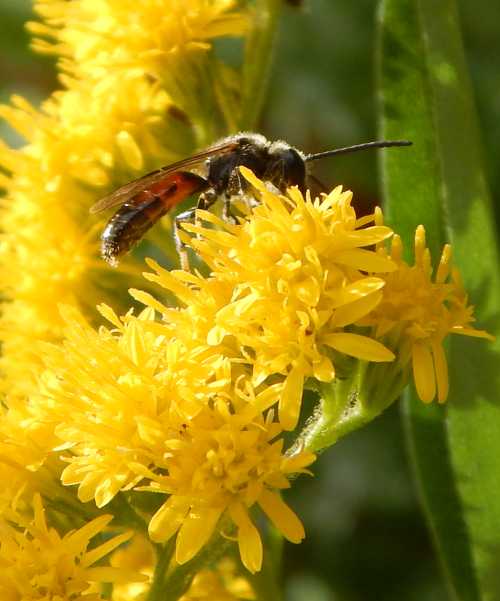 Bloomed furrow bee (male) foraging on solidago.
Bloomed furrow bee (male) foraging on solidago.
An absolute favourite of mine - Solidago - or golden rod as it is known, is a yellow flower visited by bees of multiple species, as well as many other pollinators.
It provides fantastic food for bees when colonies are at their peak, and queens need to feed up for overwintering - i.e. from August onwards.
It's also a great plant to include it in the border.
Zinnia
Zinnia come in lots of shades of jewels and pastels, and zinnias are great for bees generally, but if you are looking for yellow flowers specifically - well, they are available from the Zinnia range, and bees will visit them! Go for the more open variety.
Note, they are not always easy to go, so check suitability for including in your own region and local conditions to avoid disappointment.
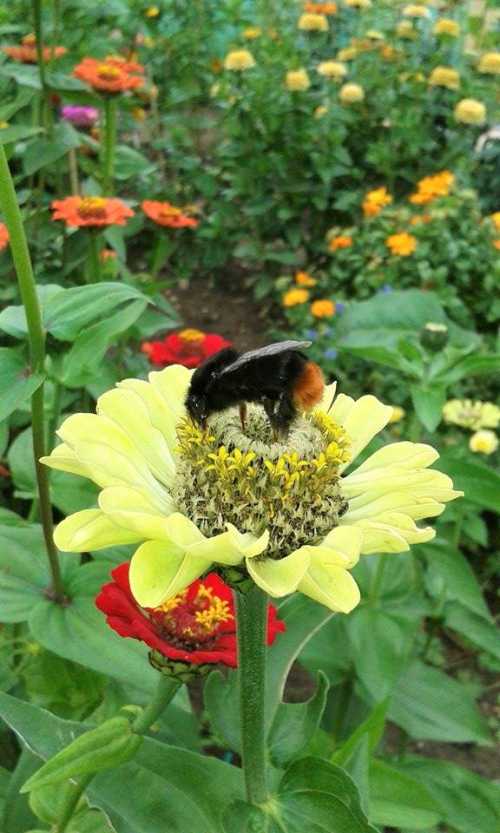 Zinnia
ZinniaWallflower
Select an old fashioned, fragrant variety if you can, and plant these lovely flowers in a sunny spot. These were growing at my allotment, but I have a different, darker shade of yellow wallflower in my garden at home, and they are visited by bees too.
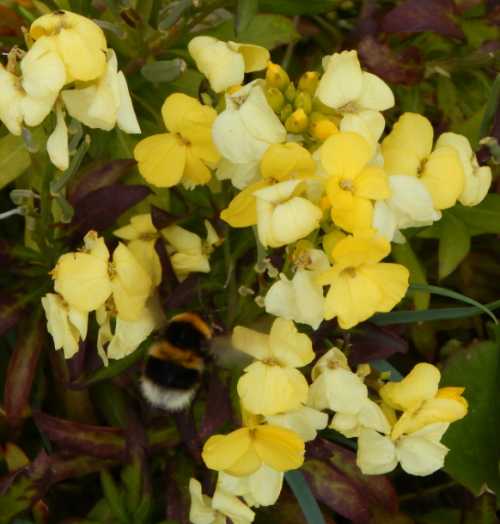 Yellow Wallflower
Yellow Wallflower
Rudbeckia - Black Eyed Susan
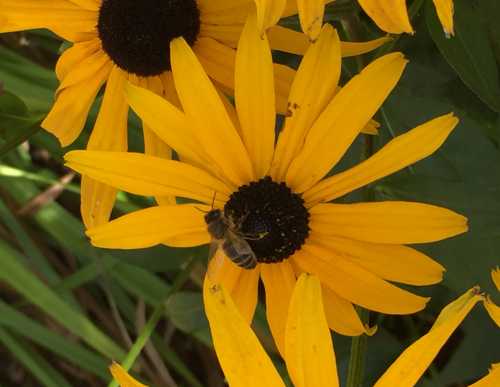 Honey bee on Rudbeckia.
Honey bee on Rudbeckia.A lovely, vibrant yellow flower loved by bees and other pollinators. Read more about planting Rudbeckia for bees.
Plant in a sunny spot where it will grow about 2 -3 feet tall.
Sunflowers / Helianthus
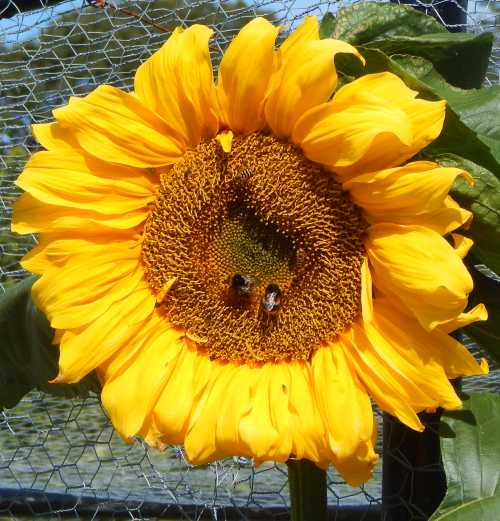
Well known for attracting bees, sunflowers are a real favourite with children. Birds can enjoy the seeds of the larger varieties later.
There are different types of sunflowers popular with bees such as the variety pictured below.
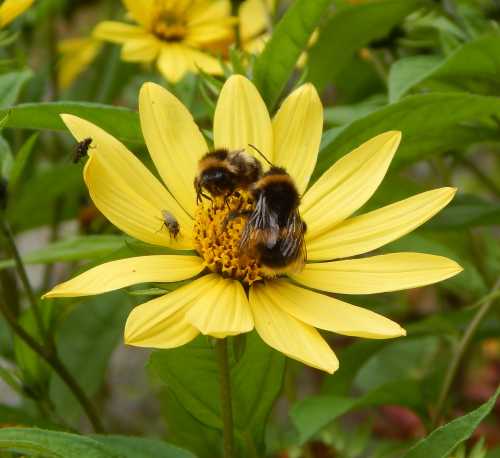 Bumble bees on Helianthus.
Bumble bees on Helianthus.Yellow Flag Iris
It can take a while to establish, but in my experience, it is worth the wait, and then it spreads out nicely. Lovely tall stems and interesting seed pods. Can grow in the pond (where it will spread more vigorously once it gets going) but I also find it works in the border too - actually quite versatile!
Helenium - Sneezeweed
Superb for attracting bees and butterflies, sneezeweed (also known as Helen's flower) comes in yellow and orangey red.
Kale
Ever since I allowed kale to go to flower on my allotment, I have been converted! Yet being a vegetable, it gets no serious consideration as a plant for bees. If you allow kale to flower, it will reward you (and the bees) with a bush of yellow, fragrant flowers in spring.
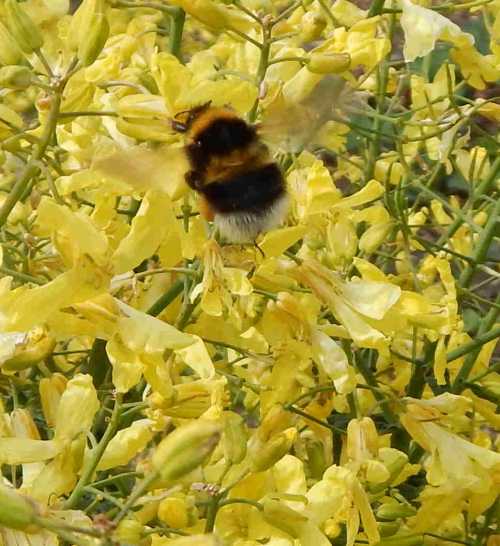 Bumble bee on kale flowers
Bumble bee on kale flowersA point to note: as well as being bushy, just one plant is a fair size, and they are quite tall.
If you are going to allow a couple to flower, make sure they have space. Plant one year for harvesting in spring, then let them flower - you can still pick some of the leaves to eat. Some people eat the seeds too (or you can plant them) - but I have not tried them.
Shrubs for bees with yellow flowers
Shrubs offer particular advantages, because they provide lots of flowers or flower heads in a concentrated area, meaning that foraging trips to shrubs are efficient as far as bees are concerned.
Hypericum
I LOVE hypericum! To watch bumblebees land on the bouncy stamens of this lovely flowering shrub, is a joy! I actually mention this among my list of fantastic shrubs for bees.
Try 'hidcote'. Wonderful!
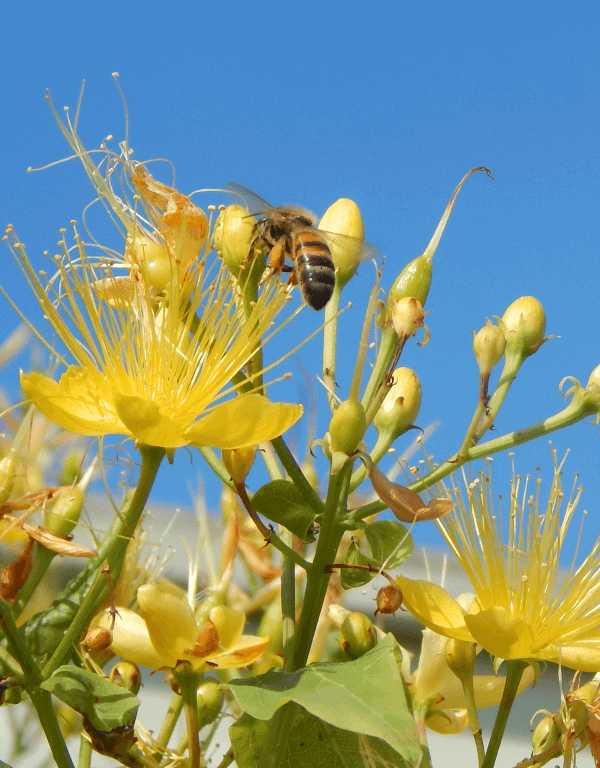 Honey bee worker foraging on Hypericum.
Honey bee worker foraging on Hypericum.Berberis
Berberis shrubs provide orangey yellow flowers - popular with bees, and lovely glossy foliage. More shrubs for bees.
Mahonia - Oregon Grape
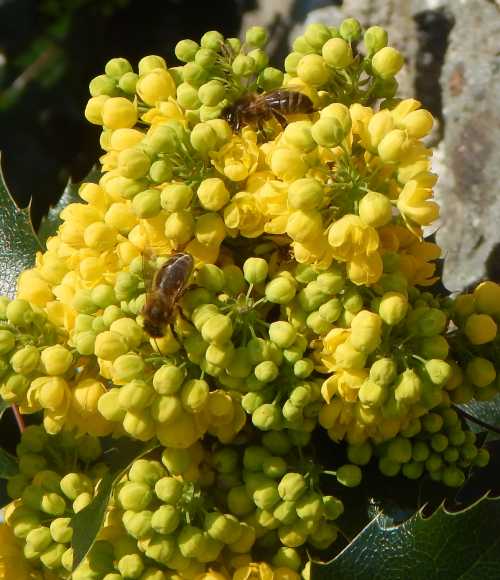
Wildflowers
There are plenty of wildflowers I could mention, and many people include them in their garden anyway. Here are three common ones:
Bird's Foot Trefoil
I like bird's foot trefoil in the rockery, but patches can also grown in the lawn (it may go brown in the autumn though - so you need to be aware of this).
It's especially attractive to bumble bees and solitary bees, such as silvery leafcutter bees.
Corn Marigold
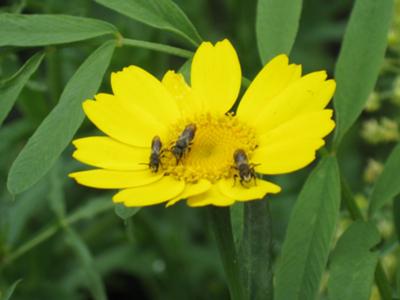 Corn marigold
Corn marigoldCorn marigold - a lovely yellow, and loved by solitary bees.
Dandelions
Lots of bees love dandelions, and they can provide much needed food when little else is available. I always let a few survive in my tiny garden, at least for periods when there is little in flower. When the bees are more interested in the other flowers, I pull the dandelions out, confident that more will appear the following year or later - and they do!
